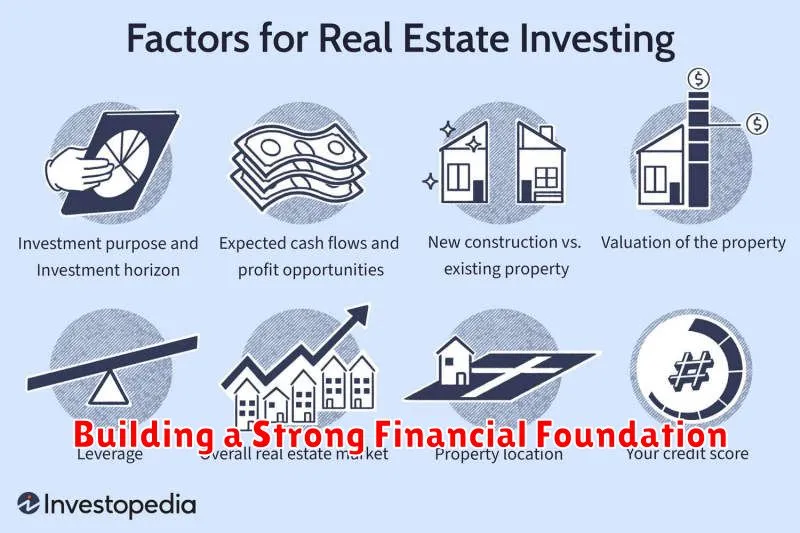Are you ready to unlock the potential of real estate in 2024? The market is constantly evolving, but with the right strategy and insights, you can maximize your returns and build a robust investment portfolio. Whether you’re a seasoned investor or just starting your journey, this comprehensive guide will equip you with essential tips and insights to navigate the real estate landscape with confidence.
In this article, we’ll delve into smart real estate investing strategies tailored for 2024, covering everything from identifying lucrative markets and analyzing property trends to understanding financing options and managing your investment effectively. Get ready to explore the latest trends, discover proven strategies, and learn how to make informed decisions that will propel your real estate investments to new heights.
Understanding Your Investment Goals and Risk Tolerance

Investing is a crucial aspect of financial planning, and understanding your investment goals and risk tolerance is essential for making informed decisions. Your investment goals are the financial objectives you aim to achieve through investing, while your risk tolerance represents your willingness to accept potential losses in exchange for the possibility of higher returns. By aligning your investment strategy with your goals and tolerance, you can maximize your chances of achieving your financial aspirations.
Investment Goals
Your investment goals can range from short-term aspirations, such as saving for a down payment on a house, to long-term objectives, such as retirement planning. When setting goals, it’s important to be specific, measurable, achievable, relevant, and time-bound (SMART). This helps ensure your goals are well-defined and trackable.
Risk Tolerance
Risk tolerance is a measure of your willingness to take on risk in pursuit of financial returns. It’s influenced by factors such as your age, financial situation, investment experience, and personal preferences. Individuals with a high risk tolerance are typically comfortable accepting greater volatility in their investments in exchange for the potential for higher returns, while those with a low risk tolerance prefer investments with lower potential returns but also lower risk.
Assessing Your Risk Tolerance
Several tools and resources can help you assess your risk tolerance. These include online questionnaires, financial advisor consultations, and self-assessment exercises. It’s important to choose a method that is appropriate for your individual circumstances and level of comfort.
Aligning Goals and Risk Tolerance
Once you have a clear understanding of your investment goals and risk tolerance, you can begin to align your investment strategy accordingly. For example, if your goal is to save for retirement and you have a high risk tolerance, you may choose to invest a larger portion of your portfolio in stocks, which historically have higher growth potential. Conversely, if you are saving for a short-term goal and have a low risk tolerance, you may choose to invest a larger portion of your portfolio in bonds or other conservative investments.
Conducting Thorough Market Research

Market research is crucial for any business, big or small. It helps you understand your target audience, identify your competitors, and discover opportunities for growth. By conducting thorough market research, you can make informed decisions about your product, pricing, marketing, and overall business strategy. However, many businesses fail to conduct proper market research, leading to costly mistakes and missed opportunities.
Here are some key steps to conducting thorough market research:
1. Define Your Research Objectives
Before you start collecting data, it’s important to define your research objectives. What specific questions do you want to answer? What information do you need to make informed decisions? For example, you might want to understand your target audience’s demographics, needs, and preferences. Or, you might want to identify your competitors’ strengths and weaknesses. By defining your objectives, you’ll ensure that your research is focused and relevant.
2. Collect Primary and Secondary Data
There are two main types of data you can collect for market research: primary and secondary. Primary data is information you collect yourself, such as through surveys, interviews, focus groups, or observation. Secondary data is information that has already been collected by others, such as industry reports, government data, or articles.
Each type of data has its own advantages and disadvantages. Primary data is often more relevant to your specific needs, but it can be more time-consuming and expensive to collect. Secondary data is readily available and less expensive, but it may not be as specific or up-to-date.
3. Analyze Your Data
Once you’ve collected your data, you need to analyze it to identify trends, patterns, and insights. This can be done using statistical software, spreadsheets, or even simple charts and graphs. The goal of data analysis is to extract meaningful information that will help you make informed decisions.
4. Draw Conclusions and Recommendations
Based on your data analysis, you need to draw conclusions about your target market, your competitors, and your business opportunities. These conclusions should be supported by evidence and should be actionable. You should also develop specific recommendations for your business based on your research findings.
5. Implement and Monitor Your Findings
Once you’ve drawn conclusions and recommendations, it’s important to implement them and monitor their effectiveness. This will help you track your progress and make adjustments as needed. You should also revisit your market research on a regular basis to stay up-to-date on changes in your target market and your competitors.
Building a Strong Financial Foundation

In the realm of personal finance, a strong financial foundation is the bedrock upon which you can build a secure and prosperous future. It’s not just about accumulating wealth; it’s about cultivating healthy financial habits, managing your money effectively, and achieving financial independence. By taking proactive steps to build a solid financial foundation, you empower yourself to achieve your financial goals, navigate life’s uncertainties, and create a brighter future for yourself and your loved ones.
Key Pillars of a Strong Financial Foundation
Building a strong financial foundation rests on several key pillars, each contributing to your overall financial well-being.
1. Budgeting and Saving:
A comprehensive budget is the cornerstone of financial discipline. It involves tracking your income and expenses, identifying areas where you can cut back, and allocating your resources strategically. Saving is an essential element of building wealth. By setting aside a portion of your income regularly, you can create a financial safety net, invest for the future, and achieve your financial aspirations.
2. Managing Debt:
Debt can be a significant financial burden, hindering your progress towards financial freedom. It’s crucial to manage debt responsibly by prioritizing high-interest loans, making timely payments, and exploring options for debt consolidation or repayment strategies.
3. Investing:
Investing is a powerful tool for growing your wealth over time. By investing in a diversified portfolio of assets, such as stocks, bonds, real estate, and precious metals, you can harness the power of compounding returns and outpace inflation. It’s essential to conduct thorough research, understand your risk tolerance, and seek professional advice if needed.
4. Protecting Your Assets:
Insurance plays a vital role in protecting your financial security. By obtaining adequate insurance coverage for your home, car, health, and other valuable assets, you safeguard yourself from potential financial losses due to unexpected events.
5. Retirement Planning:
Retirement planning is a crucial aspect of long-term financial security. It involves setting realistic goals, determining your retirement income needs, and choosing the appropriate retirement savings vehicles, such as 401(k)s, IRAs, and Roth IRAs.
The Benefits of a Strong Financial Foundation
A strong financial foundation offers numerous benefits, empowering you to:
- Achieve financial independence and freedom.
- Navigate life’s uncertainties with greater confidence.
- Pursue your dreams and aspirations without financial constraints.
- Secure your financial future and provide for your loved ones.
- Experience greater peace of mind and reduce financial stress.
Steps to Building a Strong Financial Foundation
Building a strong financial foundation requires a proactive and disciplined approach. Here are some practical steps you can take:
- Create a budget and stick to it.
- Track your expenses and identify areas for savings.
- Pay off high-interest debt as quickly as possible.
- Start investing early and regularly.
- Obtain adequate insurance coverage.
- Plan for retirement and begin saving early.
- Educate yourself about personal finance and seek professional advice when needed.
Building a strong financial foundation is an ongoing journey, not a destination. By committing to financial discipline, making informed decisions, and embracing the principles of sound financial management, you can lay the groundwork for a secure and prosperous future.
Exploring Different Real Estate Investment Strategies

Investing in real estate can be a lucrative and rewarding endeavor, but it requires careful planning and a deep understanding of the market. With numerous strategies available, it’s essential to choose the one that aligns with your financial goals, risk tolerance, and time commitment. Here, we delve into some of the most popular real estate investment strategies to help you navigate this complex landscape.
Buy and Hold
The most common strategy, buy and hold, involves purchasing a property with the intention of holding it for an extended period, typically several years or even decades. This strategy relies on long-term appreciation in property value and consistent rental income. It’s suitable for investors seeking passive income and capital gains over time. Advantages include:
- Potential for appreciation: Real estate values generally increase over time, offering the possibility of significant capital gains.
- Passive income: Rental income can generate a steady stream of cash flow.
- Tax benefits: Deductible expenses, such as mortgage interest and property taxes, can reduce your tax liability.
- Building equity: As you pay down your mortgage, you build equity in the property.
However, buy and hold has potential drawbacks:
- Illiquidity: Real estate is not as liquid as stocks or bonds, making it difficult to quickly sell your investment.
- Market volatility: Property values can fluctuate, potentially leading to losses.
- Property management: Managing rental properties can be time-consuming and demanding.
Fix and Flip
The fix and flip strategy involves purchasing distressed properties at below-market prices, renovating them, and then selling them for a profit. This strategy requires a strong understanding of construction and renovation, as well as the ability to source properties at bargain prices. This strategy appeals to investors seeking quick profits.
Advantages of this strategy include:
- Faster returns: Fix and flips typically generate returns within a shorter timeframe compared to buy and hold.
- Potential for high profits: With proper planning and execution, fix and flips can yield substantial profits.
However, fix and flip also presents certain risks:
- Renovation costs: Unforeseen renovation costs can quickly erode profits.
- Time constraints: Completing renovations within a reasonable timeframe is crucial to maximize profitability.
- Market demand: Selling the flipped property at the right price and finding a buyer quickly is essential.
Rental Property Investment
Investing in rental properties is a popular strategy that involves purchasing properties and renting them out to tenants. This strategy can provide a stable stream of passive income and build long-term wealth. It’s a good choice for investors who have the time and resources to manage properties.
The advantages of rental property investment include:
- Consistent cash flow: Rental income provides a regular stream of passive income.
- Tax benefits: Deductible expenses can help reduce tax liability.
- Long-term appreciation: Rental properties have the potential to appreciate in value over time.
However, rental property investment also involves some challenges:
- Property management: Managing tenants, maintenance, and repairs can be time-consuming.
- Vacancy risk: Periods of vacancy can impact cash flow.
- Tenant issues: Dealing with difficult or problematic tenants can be stressful.
Real Estate Investment Trusts (REITs)
REITs are companies that own and operate income-producing real estate, such as apartments, office buildings, and shopping centers. Investors can buy shares in REITs like stocks, offering a way to diversify their real estate portfolio without directly owning properties. REITs are liquid and offer dividends, providing a steady stream of income. However, it’s important to note that REITs can be subject to market volatility and potential risks.
The benefits of REITs include:
- Diversification: Investing in REITs allows diversification across different property types and geographic locations.
- Liquidity: REITs are publicly traded, making them easily bought and sold.
- Dividends: REITs typically pay dividends, providing investors with regular income.
However, some risks associated with REITs include:
- Market volatility: REIT prices can fluctuate with the broader market.
- Interest rate sensitivity: REITs can be affected by changes in interest rates.
- Management risk: The performance of a REIT depends on the quality of its management team.
Crowdfunding
Real estate crowdfunding is a relatively new but growing trend that allows individuals to pool their money together to invest in commercial or residential properties. This strategy offers investors access to larger-scale real estate deals that they may not be able to afford on their own. Crowdfunding platforms offer varying levels of risk and return, so investors should carefully consider their investment goals and risk tolerance.
The advantages of real estate crowdfunding include:
- Accessibility: It makes real estate investing accessible to individuals with limited capital.
- Diversification: Crowdfunding allows for diversification across various property types and locations.
- Professional management: Crowdfunding platforms typically have experienced real estate professionals managing investments.
However, some risks associated with real estate crowdfunding include:
- Illiquidity: Investments in crowdfunding projects can be illiquid, making it difficult to quickly sell them.
- Lack of control: Investors may have limited control over the investment decisions.
- Platform risk: The success of the investment depends on the platform’s stability and management.
In conclusion, understanding the nuances of various real estate investment strategies is crucial for investors seeking to maximize their returns and minimize risks. Each strategy comes with its own set of advantages and disadvantages, requiring careful consideration of individual financial goals, risk tolerance, and time commitment.
The Power of Leverage in Real Estate Investing

Leverage, in the context of real estate investing, refers to the use of borrowed money to finance a property purchase. It’s a powerful tool that can amplify your returns and accelerate your wealth-building journey, but it also comes with its own set of risks. Understanding the pros and cons of leverage is crucial for any aspiring real estate investor.
The Advantages of Leverage
Leverage can be a game-changer for real estate investors. Here’s why:
- Amplified Returns: Leverage allows you to control a larger asset with a smaller initial investment. When your property appreciates in value, your equity growth is magnified because you only put down a portion of the purchase price.
- Increased Purchasing Power: By borrowing money, you can acquire properties that would otherwise be out of reach. This opens up opportunities to invest in higher-value properties with the potential for greater returns.
- Tax Advantages: Interest payments on mortgage loans are often tax-deductible, which can reduce your taxable income and save you money.
The Risks of Leverage
While leverage can be beneficial, it’s essential to acknowledge the potential risks:
- Higher Debt Burden: Using leverage means taking on debt, which comes with monthly payments and interest charges. If your income fluctuates or property values decline, you could struggle to meet your obligations.
- Negative Cash Flow: If your rental income doesn’t cover your mortgage payments and other expenses, you’ll experience negative cash flow, which can strain your finances.
- Loss of Equity: In a declining market, property values could fall below your outstanding loan balance, leading to negative equity or a situation where you owe more than the property is worth.
Using Leverage Wisely
To harness the power of leverage effectively, consider these strategies:
- Thorough Research: Carefully analyze the market, property values, and your ability to handle the debt burden before taking on leverage.
- Conservative Financing: Choose loan terms with reasonable interest rates and a comfortable payment schedule. Avoid overstretching yourself with excessive debt.
- Diversification: Spread your investments across multiple properties and asset classes to minimize risk and enhance potential returns.
Leverage can be a powerful tool for real estate investors, but it’s not a magic bullet. Understanding the risks and employing responsible strategies can help you leverage your finances to build wealth and achieve your real estate goals.
Working with a Qualified Real Estate Agent

Buying or selling a home is a significant financial decision, and it’s crucial to have the right guidance and expertise throughout the process. This is where a qualified real estate agent comes in. A skilled agent can navigate the complexities of the market, advocate for your best interests, and help you achieve your real estate goals.
Here are some key benefits of working with a qualified real estate agent:
Market Knowledge and Expertise
Real estate agents possess in-depth knowledge of the local market, including current trends, pricing strategies, and inventory availability. They can provide valuable insights into neighborhoods, schools, amenities, and property values, enabling you to make informed decisions.
Negotiation Skills
Negotiating a real estate transaction can be challenging, especially for first-time buyers or sellers. A qualified agent is an expert negotiator who can advocate for your interests, ensuring you get the best possible outcome. They’ll understand the nuances of offers, counteroffers, and closing costs, and work diligently to secure a favorable deal.
Access to Resources
Real estate agents have access to a vast network of resources, including lenders, inspectors, and legal professionals. They can connect you with reputable professionals who can assist you with financing, property inspections, and other essential aspects of the transaction.
Time-Saving Convenience
Finding and purchasing a home or selling your current property can be a time-consuming process. A qualified agent can handle the heavy lifting, from scheduling showings to managing paperwork, freeing up your time and minimizing stress.
Professional Guidance and Support
Throughout the entire real estate journey, a qualified agent will provide personalized guidance and support. They’ll answer your questions, address your concerns, and ensure you feel confident and informed every step of the way.
Conclusion
Working with a qualified real estate agent is essential for a smooth and successful real estate experience. By leveraging their expertise, negotiation skills, and resources, you can navigate the market with confidence and achieve your real estate goals.
Due Diligence: Inspecting Properties Before You Buy

Buying a property is a significant financial investment, and it’s crucial to conduct thorough due diligence before making a final decision. Due diligence involves carefully inspecting the property and reviewing relevant documents to ensure that you’re making an informed and sound purchase.
Why is Due Diligence Important?
Due diligence protects you from potential surprises and costly mistakes. By conducting a thorough inspection, you can:
- Identify any hidden defects or problems with the property.
- Assess the condition of the property and its systems.
- Determine if the property is suitable for your needs and future plans.
- Negotiate a fair purchase price based on the property’s condition.
- Avoid legal issues or disputes later on.
Key Steps in Due Diligence
Due diligence involves several key steps, including:
1. Physical Inspection
A physical inspection is crucial for assessing the property’s condition. You should hire a qualified professional inspector to conduct a thorough examination, including:
- Structure: Foundation, walls, roof, and framing.
- Systems: Plumbing, electrical, heating, ventilation, and air conditioning.
- Appliances: Kitchen appliances, bathroom fixtures, and laundry equipment.
- Exterior: Landscaping, driveway, and sidewalks.
2. Reviewing Documents
Reviewing relevant documents helps you understand the property’s history and potential risks. Key documents include:
- Title report: Provides information about the property’s ownership and any liens or encumbrances.
- Home inspection report: Provides a detailed assessment of the property’s condition.
- Property tax records: Show the property’s assessed value and tax history.
- Homeowners association documents: Outline rules and regulations for homeowners associations.
- Seller’s disclosures: Provide information about any known defects or issues with the property.
3. Environmental Assessment
Depending on the property’s location and history, you may want to conduct an environmental assessment. This can help identify any potential environmental hazards, such as:
- Asbestos
- Lead paint
- Mold
- Underground storage tanks
4. Financial Review
It’s important to review your finances and ensure that you can afford the property. Consider factors such as:
- Down payment
- Mortgage payments
- Property taxes
- Homeowners insurance
- Maintenance costs
5. Legal Counsel
Consult with a real estate attorney to review the purchase contract and other legal documents. An attorney can protect your interests and ensure that the transaction is fair and legally sound.
Conclusion
Due diligence is an essential part of buying a property. By taking the necessary steps to inspect the property and review relevant documents, you can make an informed and confident decision about your purchase. Remember, due diligence is not just about avoiding problems; it’s about making a smart investment and ensuring that you’re getting the best possible value for your money.
Understanding Real Estate Taxes and Regulations

Owning real estate is a significant investment, and it comes with its own set of responsibilities, including understanding the intricacies of real estate taxes and regulations. These elements can significantly impact your financial burden and overall experience as a property owner. This guide provides a comprehensive overview of real estate taxes and regulations, covering key aspects and considerations.
What are Real Estate Taxes?
Real estate taxes, also known as property taxes, are levied by local governments on the value of your property. These taxes are a primary source of funding for essential services like schools, fire departments, police, and infrastructure.
How are Real Estate Taxes Calculated?
Real estate taxes are generally calculated based on the assessed value of your property. The assessment process involves determining the fair market value of your property, which can vary depending on factors such as location, size, condition, and amenities. The assessed value is then multiplied by the tax rate set by the local government to determine your annual property tax liability.
Types of Real Estate Taxes
There are different types of real estate taxes, including:
- Property Taxes: These are the most common type of real estate tax, levied on the value of your property.
- Transfer Taxes: These taxes are imposed when a property is transferred from one owner to another.
- Special Assessments: These are levied for specific improvements or services within a particular area, such as road repairs or sewer upgrades.
Understanding Real Estate Regulations
Real estate regulations are a set of rules and guidelines governing the use and development of property. These regulations can vary widely from one jurisdiction to another, encompassing aspects like:
- Zoning: Regulations that define the permitted uses of land in specific areas.
- Building Codes: Standards that dictate construction materials, safety requirements, and design features.
- Environmental Regulations: Guidelines designed to protect natural resources and prevent environmental damage.
- Housing Regulations: Rules governing the rental and sale of residential properties.
The Importance of Understanding Real Estate Taxes and Regulations
A thorough understanding of real estate taxes and regulations is crucial for several reasons:
- Financial Planning: Knowing your tax obligations allows you to effectively budget and plan your finances.
- Property Value: Real estate regulations can influence the value of your property by limiting or encouraging development opportunities.
- Legal Compliance: Failure to comply with real estate regulations can lead to fines, legal disputes, and even property seizure.
- Informed Decision-Making: Understanding these aspects helps you make informed decisions about property purchases, development, and renovations.
Resources and Guidance
To navigate the complexities of real estate taxes and regulations, it is recommended to consult with relevant resources and experts, such as:
- Local Government Offices: Contact the assessor’s office and planning department for information on tax rates, assessment procedures, and zoning regulations.
- Real Estate Professionals: Realtors, appraisers, and attorneys can provide valuable insights and guidance.
- Online Resources: Explore websites of government agencies, professional organizations, and real estate publications for comprehensive information.
By understanding real estate taxes and regulations, you can become a more informed and empowered property owner. This knowledge will equip you to make sound decisions, minimize your financial burden, and ensure compliance with legal requirements. Remember, staying informed is key to a smooth and successful real estate experience.
Property Management: Maximizing ROI on Your Investments

Owning real estate can be a lucrative investment, but managing it effectively is crucial for maximizing returns. Property management plays a vital role in ensuring your investment thrives and generates consistent income. From tenant screening and rent collection to maintenance and legal compliance, a skilled property manager handles the day-to-day operations, allowing you to focus on other aspects of your business.
Here are some compelling reasons why hiring a professional property manager can significantly enhance your ROI:
1. Expertise and Experience
Property managers possess in-depth knowledge of the real estate market, tenant laws, and best practices for maximizing rental income. They stay updated on industry trends, understand local regulations, and possess negotiation skills to secure favorable contracts and resolve issues effectively.
2. Tenant Screening and Selection
Attracting and retaining quality tenants is paramount for sustained profitability. Professional property managers employ rigorous screening processes to identify reliable and responsible tenants, reducing the risk of vacancy and costly repairs.
3. Rent Collection and Financial Management
Prompt and efficient rent collection is essential for smooth cash flow. Property managers handle all aspects of rent collection, including timely reminders, lease enforcement, and legal action when necessary. They also manage financial records, ensuring accurate accounting and maximizing profitability.
4. Maintenance and Repairs
Maintaining your property is vital for tenant satisfaction and preserving its value. Property managers oversee all maintenance and repair needs, from routine inspections to addressing emergencies. They establish reliable contractor networks to ensure timely and cost-effective services.
5. Legal Compliance
Navigating landlord-tenant laws can be complex and challenging. Property managers are well-versed in legal requirements, ensuring compliance with local ordinances, fair housing laws, and other regulations, mitigating legal risks and potential disputes.
6. Marketing and Leasing
Attracting new tenants requires effective marketing strategies. Property managers leverage their expertise and networks to market available units, conduct showings, and efficiently handle the leasing process, minimizing vacancy periods and maximizing occupancy rates.
7. Time Management and Peace of Mind
Managing rental properties can be time-consuming and demanding. By entrusting the task to a professional property manager, you free up valuable time to pursue other opportunities or simply enjoy the benefits of passive income. You can rest assured knowing your investment is in capable hands.
Investing in property management services is a smart decision that can significantly enhance your ROI, minimize risks, and provide peace of mind. By leveraging the expertise of a professional, you can unlock the full potential of your real estate investment and enjoy the benefits of passive income without the hassle.
Staying Ahead of the Curve in a Dynamic Market

In today’s rapidly evolving business landscape, adaptability and innovation are paramount to success. The market is constantly in flux, driven by technological advancements, shifting consumer preferences, and global economic trends. Businesses that fail to keep pace with these changes risk falling behind, losing market share, and ultimately failing to thrive.
To navigate this dynamic environment, it’s crucial for organizations to adopt a proactive approach. This involves a commitment to continuous learning, strategic planning, and embracing agility. Let’s explore some key strategies to help you stay ahead of the curve:
Embrace Data-Driven Decision-Making
Data provides invaluable insights into market trends, customer behavior, and competitor activities. By leveraging data analytics tools and techniques, you can gain a deeper understanding of your target audience, identify emerging opportunities, and anticipate potential challenges.
Foster a Culture of Innovation
Encourage experimentation and risk-taking within your organization. Create a culture where new ideas are welcomed, nurtured, and tested. Invest in research and development, and actively seek out partnerships and collaborations that can spark innovation.
Embrace Digital Transformation
Digital technologies are rapidly changing the way businesses operate. From e-commerce and cloud computing to artificial intelligence and blockchain, there are numerous opportunities to leverage digital solutions to enhance efficiency, improve customer experience, and gain a competitive edge.
Build a Strong Brand
A strong brand is essential for attracting and retaining customers. Develop a unique brand identity that resonates with your target audience and clearly communicates your value proposition. Invest in marketing and branding initiatives to build awareness and foster customer loyalty.
Develop a Strategic Talent Management Plan
Your workforce is your most valuable asset. Invest in talent development programs to ensure that your employees have the skills and knowledge needed to adapt to the changing market. Attract and retain top talent by offering competitive compensation, benefits, and opportunities for growth.
Be Adaptable and Resilient
The market is constantly evolving, so it’s important to be adaptable and resilient. Be prepared to make adjustments to your business strategies and operations as needed. Embrace change as an opportunity for growth and innovation.
By implementing these strategies, businesses can position themselves for success in a dynamic market. Staying ahead of the curve requires proactive planning, continuous learning, and a willingness to embrace change. With a strategic approach and a commitment to innovation, you can navigate the challenges and opportunities of a rapidly evolving business landscape and achieve lasting success.

